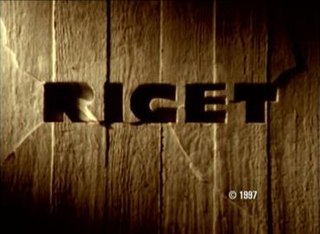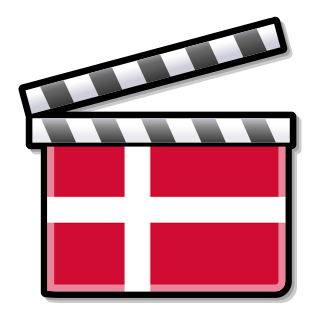Related Research Articles

Lars von Trier is a Danish filmmaker, actor, and lyricist. His reputation has been described as that of one of the most polarizing and controversial filmmakers; Cannes once listed him as persona non grata, and he has been accused of mistreating actresses during filming, including Björk and Nicole Kidman. Trier’s career has spanned more than four decades and his works have gained notoriety for his trademarks including European frequent actors, different thematic trilogies, handheld camerawork, extreme subject matters, genre and technical innovation, confrontational examination of existential, social, and political issues, and his treatment of subjects such as mercy, sacrifice, and mental health.

Dancer in the Dark is a 2000 musical drama film written and directed by Danish filmmaker Lars von Trier. It stars Icelandic musician Björk as a factory worker who suffers from a degenerative eye condition and is saving for an operation to prevent her young son from suffering the same fate. Catherine Deneuve, David Morse, Cara Seymour, Peter Stormare, Siobhan Fallon Hogan and Joel Grey also star. The soundtrack for the film, Selmasongs, was written mainly by Björk, but a number of songs featured contributions from Mark Bell and some of the lyrics were written by von Trier and Sjón.

Riget is a Danish absurdist supernatural horror miniseries trilogy created by Lars von Trier, co-written by von Trier with Niels Vørsel and co-directed by von Trier with Morten Arnfred. Set in the neurosurgical ward of Copenhagen's Rigshospitalet, each episode of the show takes place over a single day, and follows the hospital's eccentric staff and patients as they encounter bizarre and sometimes supernatural phenomena. The series is notable for its wry humor, its muted sepia colour scheme, and the appearance of a chorus of dishwashers with Down syndrome, who discuss in intimate detail the strange occurrences in the hospital. The main theme's song was written by von Trier himself.

Breaking the Waves is a 1996 psychological drama film directed and co-written by Danish filmmaker Lars von Trier and starring English stage actress Emily Watson as her feature film acting debut. Set in the Scottish Highlands in the early 1970s, it is about an unusual young woman and of the love she has for her husband, who asks her to have sex with other men when he becomes immobilised from a work accident. The film is an international co-production between Denmark and other seven European countries, while the former's involvement as his first film led by von Trier under his Danish company Zentropa. It is the first film in Trier's Golden Heart Trilogy, which also includes The Idiots (1998) and Dancer in the Dark (2000).

The Idiots is a 1998 Danish dark comedy-drama film written and directed by Lars von Trier. It is his first film made in compliance with the Dogme 95 Manifesto, and is also known as Dogme #2. It is the second film in von Trier's Golden Heart Trilogy, preceded by Breaking the Waves (1996) and succeeded by Dancer in the Dark (2000). It is among the first films to be shot entirely with digital cameras.

Denmark has been producing films since 1897 and since the 1980s has maintained a steady stream of product due largely to funding by the state-supported Danish Film Institute. Historically, Danish films have been noted for their realism, religious and moral themes, sexual frankness and technical innovation.

The Boss of It All is a 2006 experimental comedy film written and directed by Lars von Trier. The only film is known for using a cinematic technique Automavision, who invented von Trier himself, automatically chooses framing by randomly tilting, panning or zooming the camera without actively operated by the cinematographer.

Shaky camera, shaky cam, jerky camera, queasy cam, run-and-gun or free camera is a cinematographic technique where stable-image techniques are purposely dispensed with shaking. It is a hand-held camera, or given the appearance of being hand-held, and in many cases shots are limited to what one photographer could have accomplished with one camera. Shaky cam is often employed to give a film sequence an ad hoc, electronic news-gathering, or documentary film feel. It suggests unprepared, unrehearsed filming of reality, and can provide a sense of dynamics, immersion, instability or nervousness. The technique can be used to give a pseudo-documentary or cinéma vérité appearance to a film.

Zentropa, or Zentropa Entertainments, is a Danish film company started in 1992 by director Lars von Trier and producer Peter Aalbæk Jensen. Zentropa is named after the train company Zentropa in the film Europa (1991), which started the collaboration between von Trier and Jensen.
Filmbyen is a film studio complex located in Hvidovre just outside Copenhagen, Denmark.

Antichrist is a 2009 European horror art film written and directed by Lars von Trier and starring Willem Dafoe and Charlotte Gainsbourg. It tells the story of a couple who, after the accidental death of their son, retreat to a cabin in the woods where the man experiences strange visions and the woman manifests increasingly violent sexual behavior and sadomasochism. The narrative is divided into a prologue, four chapters and an epilogue.
Christoffer Boe is a Danish film director and screenwriter. He is an established and well-known not only in Denmark, but all through the world. Among his international awards there are FIPRESCI Director of the Year at San Sebastián International Film Festival and Golden Camera at Cannes Film Festival in 2003. He is also co-founder and director of the film production company AlphaVille Pictures Copenhagen.
Dogme 95 is a 1995 avant-garde filmmaking movement founded by the Danish directors Lars von Trier and Thomas Vinterberg, who created the "Dogme 95 Manifesto" and the "Vows of Chastity". These were rules to create films based on the traditional values of story, acting, and theme, and excluding the use of elaborate special effects or technology. It was supposedly created as an attempt to "take back power for the directors as artists", as opposed to the studio. They were later joined by fellow Danish directors Kristian Levring and Søren Kragh-Jacobsen, forming the Dogme 95 Collective or the Dogme Brethren. Dogme is the Danish word for dogma.

Melancholia is a 2011 apocalyptic drama art film written and directed by Lars von Trier and starring Kirsten Dunst, Charlotte Gainsbourg, and Kiefer Sutherland, with Alexander Skarsgård, Brady Corbet, Cameron Spurr, Charlotte Rampling, Jesper Christensen, John Hurt, Stellan Skarsgård, and Udo Kier in supporting roles. The film's story revolves around two sisters, one of whom marries just before a rogue planet is about to collide with Earth. Melancholia is the second film in von Trier's unofficially titled Depression Trilogy. It was preceded in 2009 by Antichrist and followed by Nymphomaniac in 2013.

The 64th Cannes Film Festival was held from 11 to 22 May 2011. American actor Robert De Niro served as the president of the jury for the main competition and French filmmaker Michel Gondry headed the jury for the short film competition. South Korean film director Bong Joon-ho was the head of the jury for the Caméra d'Or prize, which is awarded to the best first-time filmmaker. The American film The Tree of Life, directed by Terrence Malick won the Palme d'Or.
Anders Refn is a Danish film editor and director.
Kristian Eidnes Andersen is a Danish film audio engineer and composer. He heads the department of sound design at the National Film School of Denmark.
The Robert Award for Best Screenplay is one of the merit awards presented by the Danish Film Academy at the annual Robert Awards ceremony. The award has been handed out since 1984, but except in 1991 and 1993. On two occasions, in 2005 and in 2015, the Academy handed out two awards in the category, one for best original screenplay, and one for best adapted screenplay.
The 2nd Robert Awards ceremony was held on 31 March 1985 in Copenhagen, Denmark. Organized by the Danish Film Academy, the awards honoured the best in Danish and foreign film of 1984.
The 14th Robert Awards ceremony was held in 1997 in Copenhagen, Denmark. Organized by the Danish Film Academy, the awards honoured the best in Danish and foreign film of 1996.
References
- ↑ Morten Piil (2008). Gyldendals danske filmguide (in Danish). Gyldendal A/S. pp. 112–. ISBN 978-87-02-06669-2.
- ↑ Alan Kirby (1 May 2009). Digimodernism: How New Technologies Dismantle the Postmodern and Reconfigure Our Culture. Bloomsbury Publishing. pp. 183–. ISBN 978-1-4411-5416-3.
- ↑ Historical Dictionary of Scandinavian Cinema. Scarecrow Press. 31 August 2012. pp. 399–. ISBN 978-0-8108-5524-3.
- ↑ "The Boss Of It All". Film @ The Digital Fix. Retrieved 21 January 2015.
- ↑ Geoffrey Macnab (22 September 2006). "Geoffrey Macnab talks to Lars Von Trier". The Guardian. Retrieved 21 January 2015.
- ↑ Nicholas Rombes (2009). Cinema in the Digital Age. Columbia University Press. pp. 139–. ISBN 978-1-905674-86-2.
- ↑ Yvonne Tasker (4 October 2010). Fifty Contemporary Film Directors. Routledge. pp. 385–. ISBN 978-1-136-91945-9.
- ↑ Sheila Johnston (22 February 2008). "Lars Von Trier's funny turn". Telegraph.co.uk. Retrieved 21 January 2015.
- ↑ Davina Quinlivan (1 May 2012). The Place of Breath in Cinema. Oxford University Press. pp. 138–. ISBN 978-0-7486-6474-0.